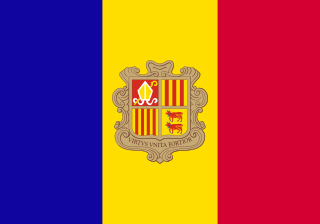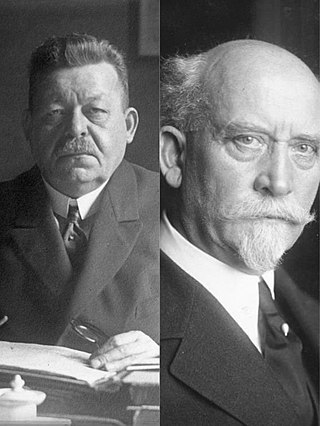
Andorra, officially the Principality of Andorra, is a sovereign landlocked country on the Iberian Peninsula, in the eastern Pyrenees in Western Europe, bordered by France to the north and Spain to the south. Believed to have been created by Charlemagne, Andorra was ruled by the count of Urgell until 988, when it was transferred to the Roman Catholic Diocese of Urgell. The present principality was formed by a charter in 1278. It is currently headed by two co-princes: the Bishop of Urgell in Catalonia, Spain, and the president of France. Its capital and largest city is Andorra la Vella.

The Liberals of Andorra is a conservative-liberal political party in Andorra. It is a member of the Liberal International and the Alliance of Liberals and Democrats for Europe.

General elections were held in the Netherlands on 5 July 1922. They were the first elections held under universal suffrage, which became reality after the acceptance of a proposal by Henri Marchant in 1919 that gave women full voting rights. Almost all major parties had a woman elected. The number of female representatives increased from one to seven. Only the Anti-Revolutionary Party principally excluded women from the House of Representatives. Another amendment to the electoral law increased the electoral threshold from 0.5% to 0.75%, after six parties had won seats with less than 0.75% of the vote in the previous elections.

There are two types of elections in Andorra: parliamentary elections and local elections. The 28 members of the General Council of the Valleys are elected in parliamentary elections for a maximum term of four years. In the local elections, the council members of the seven parishes of Andorra are elected for a four-year term.

Federal elections were held in Germany on 19 January 1919, although members of the standing army in the east did not vote until 2 February. The elections were the first of the new Weimar Republic, which had been established after World War I and the Revolution of 1918–19, and the first with women's suffrage. The previous constituencies, which heavily overrepresented rural areas, were scrapped, and the elections held using a form of proportional representation. The voting age was also lowered from 25 to 20. Austrian citizens living in Germany were allowed to vote, with German citizens living in Austria being allowed to vote in the February 1919 Constitutional Assembly elections.

Unity and Renewal was a local political party in Canillo, Andorra.
General elections were held in Luxembourg on 26 October 1919. They were the first held after several constitutional amendments were passed on 15 May of the same year. The reforms had introduced universal suffrage and proportional representation, increased the electorate from 6% of the population to 42%, and vested national sovereignty in the people, as opposed to the Grand Duke. They were also the first elections held after the German occupation during World War I.

General elections were held in Belgium on 26 June 1949. Several reforms took effect prior to the elections; they were the first after the introduction of universal women's suffrage; the number of seats in the Chamber of Representatives was increased from 202 to 212, and from now on, elections for the nine provincial councils were held simultaneously with parliamentary elections. The number of Chamber seats and the simultaneous provincial and parliamentary elections would remain unchanged until state reforms in 1993.

Parliamentary elections were held in Andorra on 9 December 1981, with a second round of voting on 16 December. Local elections were held on the same day. Following the elections, Òscar Ribas Reig became the country's first Prime Minister.

Parliamentary elections were held in Andorra on 12 and 19 December 1985. As political parties were not legalised until 1993, all candidates ran as independents. Following the election, Josep Pintat-Solans remained Prime Minister.

Parliamentary elections were held in Andorra on 10 December 1989, with a second round of voting on 17 December. Following the elections, Òscar Ribas Reig became Prime Minister, elected on 12 January 1990 by a vote of 23−5.

A constitutional referendum was held in Andorra on 14 March 1993. Drafted by the Co-Princes and the General Council, the new constitution was approved by 74.2% of voters, with a 76% turnout. The first elections under the new constitution were held later in the year.

Full general elections were held in Belgium on 14 October 1894, with run-off elections held on 21 October 1894.
Full general elections were held in Belgium on 2 June, 1912.
Parliamentary elections were held in Greece between June and August 1844. Supporters of Andreas Metaxas emerged as the largest block in Parliament. However, Ioannis Kolettis became Prime Minister on 18 August.
General elections were held in Romania in December 1933, the third in three years. The Chamber of Deputies was elected on 20 December, whilst the Senate was elected in three stages on 22, 28 and 29 December.
The Andorran Union was an Andorran political formation established in 1933, during the heat of the Andorran Revolution. The formation defended universal male suffrage, the creation of a status of Andorran nationality and the General Council that was dismissed by the French occupation forces.
The Andorran Revolution, also known as the Revolution of 1933, was a democratic uprising led by the Young Andorrans that called for political reforms, universal suffrage for all Andorrans and acted in defense of the rights of local and foreign workers during the construction of FHASA's hydroelectric power station in Encamp. On April 5, 1933, the Young Andorrans seized the Andorran Parliament. These actions were preceded by the arrival of Colonel René-Jules Baulard with 50 gendarmes and the mobilization of 200 local militias or sometent led by the Síndic Francesc Cairat.
Anarchism in Andorra peaked during the 1930s, when anarchist ideas were at the forefront of revolutionary politics in the Catalan countries.








